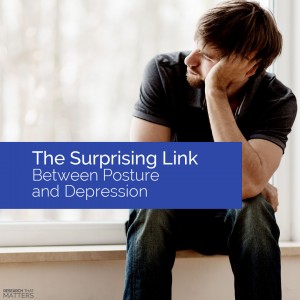
Bottom Line:
Have you ever been able to tell what someone’s mood is just by how they walked into a room? We all have! It’s a great example of how our posture and attitude are connected. Within seconds you can look at someone and tell whether they are confident, depressed, withdrawn, or happy. Emotions, posture, and pain sensitivity are all influenced by each other to some degree.
Why it Matters:
Postural change has been linked to depression and other health challenges. Maintaining an unnatural, stooped posture can often create aches and pains that exacerbate depression. It’s a vicious cycle. On the flip side, a recent study discovered that people who were depressed found their mood to improve after they changed their posture.
The exact reason for these changes is yet to be discovered. It may be as simple as people feeling better about themselves by demonstrating a confident posture. Our body posture and position can also influence the release of endorphins, or feel-good chemicals in the brain.
- Slumped posture has been linked with depression symptoms.
- An upright posture has been shown to improve mood.
- Emotions and thoughts affect your posture and energy level.
Next Steps:
Look up and pull your shoulders back to reset your mind and body! The next time you are feeling down or depressed, pay attention to your posture. You’ll likely be slumped with your head and neck curved forward and down. A simple change in posture may help you feel more confident, energetic, and happy. And if your posture is causing neck or back pain, give us a call. We’ll be glad to help!
If you’re experiencing depression, ask us about EEG (brain wave testing) and Neurofeedback treatment as well as we recommend reaching out to a mental health professional for help. You’ve got this!
Science Source(s):
Upright Posture Improves Affect and Fatigue in People with Depressive Symptoms. Journal of Behaviour Therapy and Experimental Psychiatry. 2017.
